- Home
- Lisa Wingate
A Thousand Voices Page 6
A Thousand Voices Read online
Page 6
A rush of warmth enveloped me, pushing away the sting of memories. I snuggled into the realization that so often pulled me to the surface when I lost myself. If I wasn’t worth loving, James and Karen couldn’t possibly love me so much.
Tears clouded my eyes as Blues Traveler played on. They were happy tears, the grateful kind that made me feel solid and grounded, complete. Pulling off the highway, I thought about going back home to Kansas City.
What could I possibly hope to find in Oklahoma? What else could I possibly need? I had a family, a home, parents who loved me, college applications to fill out. Yet there was an emptiness swelling inside me, and in the past year it had eclipsed even my music. Where the music had been, there was a thickening mire of old memories, lingering insecurities, and unanswered questions.
Maybe some of the answers lay in Oklahoma.
I didn’t know where else to look.
Pulling back onto the highway, I fished my cell phone from my purse and dialed James’s number, even though I knew he would probably be flying and wouldn’t answer. When his voice mail came on, I turned up Blues Traveler and held the cell phone close to the speaker as the first notes of “The Mountains Win Again” blasted through the car. It was our traveling song, the one we always played on family vacations to the mountains of Colorado and California. Our theme song as a family.
When the intro was over, I put the phone to my ear. “Hey, Dad. I’m headed out of town to visit Barry and I just turned on the radio. Thanks for putting my CD in here. See you later this week and…” I paused, thinking I should say something more, something that encompassed my feelings, that was worthy of the unconditional love the CD represented. I was afraid that if I did, James and Karen would clue in to the fact that I was sounding too emotional for a simple junket to Missouri State. They might start to wonder what was going on, and call Barry.
Finally, I swallowed hard and settled for ending the call with, “Safe trip, okay?” Then I slipped my cell phone back into my purse and focused on the road
CHAPTER 5
In the late afternoon, I pulled off the turnpike into a combination gas station, McDonald’s, and convenience store built in the grassy median between the northbound and southbound lanes. Climbing out of the car, I yawned and stretched, bracing my hands on the window frame and taking things in like a dreamer waking from a deep sleep. For hours, my mind had been so far away, I barely remembered the drive.
My stomach rumbled as I surveyed the surrounding folds of tree-clad earth, at first glance similar to the Ozark Mountains back home. But up close, the sights and smells were different. The air was heavy with humidity, scented by thick stands of pine. Back home there would have been mostly hardwoods. At the end of the parking lot a logging truck was pulling in, laden with a towering stack of tree trunks. The hills showed evidence of clear-cutting and reforestation. In the grass next to the convenience store, near a few picnic tables, a patch of small sycamore and redbud trees rustled in the breeze. Nearby, some women in floppy straw hats and gardening gloves were planting petunias in a flower bed beside a sign that read, KIAMICHI GARDEN CLUB WELCOMES YOU!
I didn’t feel welcome. I felt out of place, insecure, guilty of something I couldn’t put into words. Calm down, a voice whispered in my head. There’s nothing to be afraid of here.
Deep down, I was afraid. I was afraid that this trip would bring my life tumbling down like a house of cards, and when it was all over, I’d be left with nothing.
“You lost?” one of the gardening ladies asked, standing up and stretching her back.
“No, ma’am.” The words were thin and uncertain, and the woman cocked her head to one side, taking a step closer, her trowel dangling at her side.
“Everythin’ all right?” she asked, and I nodded, clearing my throat.
“Long drive,” I told her, and she formed her lips into a silent O. “How far to Durant?”
“Durant’s a piece down the road.” She mopped her forehead with the back of her arm, her trowel dropping bits of dirt into a nest of teased silver hair. “Which way you comin’ from?”
“North.” I waved vaguely in the direction of home. “Kansas City.”
She clicked her tongue against her teeth sympathetically. “Oh, hon, you should of got off onto sixty-nine at McAlester. It’s a lot shorter. But you can go this way. Just keep on the turnpike to Hugo, then take seventy west…ummm…little over an hour from here, dependin’ on exactly where you’re going. You headed to college at Durant?”
“No, ma’am.” My body, still stiff from the flu, protested at the idea of another hour in the car. “I’m looking for the Choctaw tribal center.” Saying it out loud felt like treason. I reminded myself that I was miles from home and nobody here knew me.
“Ohhh!” she exclaimed with a burst of enthusiasm that made me draw back. “Well, now wait a minute. If you’re lookin’ for the Choctaws, you’ve got to go back the way you already been. They’re all at the tribal council house grounds this weekend. You should of exited back at Daisy, but from here, you just take the Antlers exit and go up two-seventy-one through Finley and Snow to Clayton, then cut off on highway two just a few miles to the council house grounds. It’s a pretty drive up through the mountains. My husband and I used to go out that way every spring and fall, just to look at the colors. There’s something special about the change in seasons.”
“How far is it? To the council house, I mean.”
Shifting her hips to one side, she squinted toward the east as if she were getting a visual on my destination. “Not too far. Less than an hour.” She glanced over her shoulder at the rest of the gardeners. “Nita, how many miles to the Choctaw Council House grounds?”
Nita, a heavyset woman in a denim broom skirt and tennis shoes, stood up and squinted eastward. “I don’t know for sure, Cecil. Never clocked it, but I’d say it’s likely forty-five miles or so, probably. Bit of a slow trip this way, up and down the mountains and all. Take ya…maybe an hour. It’s a pretty drive, though. Not much traffic on that road, ever. More than usual this weekend, of course, what with all the Labor Day festivities.” Wandering a few steps closer, she pursed her lips and puffed away a fallen strand of curly, artificially-red hair. “You here for the powwow?”
Cecil slowly rolled her chin sideways. “Nosy.”
“I was just makin’ conversation.”
“We don’t have time for conversation. We got eighteen flats of pansies to plant.” She waved toward the rest of the women, who were still busily planting flowers.
One of them sat back on her heels and eyed us from beneath her sun hat. “Nineteen, now,” she corrected. “They’re growing faster than you two are putting ’em in the ground.” Around her, the other ladies chortled.
“They’re multiplyin’ all over the place, you better git over here,” a dark-skinned woman added, bracing her hand on the ground and lifting her chin so that her strong Native American features were visible beneath the hat. I had an odd sense of being Native American, too. “It’s a full-scale pansy invasion, and we’re gettin’ trapped in it, ’cause Cecil and Nita cain’t stop talkin’ to the folks on the sidewalk. First it was that family with the twins, then the lady in the motor home, and now they’re harassin’ the customers again. We’re gonna git swallered up by a full-scale pansy invasion, and Cecil and Nita ain’t even gonna notice.”
Cecil glanced at Nita, her lips twitching. “Guess we better get back to work.”
“Guess so.” Both of them burst into laughter.
“Pansy invasion.” Nita hip-butted Cecil, knocking her sideways.
Cecil wrapped her arms around her stomach. “Oh-oh-o, stop that. You’re givin’ me bladder control issues.”
“I know a good doctor for that,” someone else interjected, and the rest of them laughed harder.
Cecil turned back to me. “You need me to write down those directions, hon?”
I thumbed over my shoulder toward my car. “No. I have a map. Guess I should have gotten it out and
looked at it sooner. Thanks, though. Is there a good place to stay over there? Something not too expensive?”
Pinching her bottom lip between her thumb and forefinger, she blew air through her teeth. “There’s a couple little hotels in Clayton, but things’ll be booked up for the Choctaw Labor Day Festival, especially bein’ as it’s Thursday night, and the events start tomorrow. There’s no hotel right there by the tribal grounds at Tuskahoma.”
I blinked, blood draining from my face at the mention of Tuskahoma, a word so far back in my memory it was like an archaeological clue buried deep below the surface. My mother had said that word to me once. She told me I was born there. “Oh….”
“Honey.” Cecil’s eyes met mine, and beside her, Nita’s face narrowed with concern. “Is somethin’ wrong? You’re white as a Sunday shirt. Are you all right?”
“No…no, I’m fine,” I said, trying to regain my senses. Tuskahoma. The word whispered in my mind. “I didn’t think about all the hotels being full, that’s all. I can stay in the nearest big town if I have to. It’s no big deal.”
Nita’s lips pursed skeptically. “Try the Four Winds, out by Sardis Lake on two-seventy-one north of Clayton. They might have a place, being as it’s kind of out of the way.” Taking a step closer, she leaned in and lowered her voice, so that only Cecil and I could hear. “Child, are you sure you’re not in some kind of trouble?”
“I’m fine. Thanks.” With a wave, I headed toward my car, feeling like a teenage runaway.
“Safe trip,” she said. At least I thought I heard it, but when I glanced back, she’d already returned to the pansies.
A chill ran through me, and I wrapped my arms around myself, hurried into the McDonald’s for a hamburger and a soda, then back to my car. After checking my map, I headed out of the parking lot, past the garden club ladies. Nita and Cecil stopped to watch as I drove away, headed for Tuskahoma, the place where I was born.
The trip was pleasant, scenic, as the garden club ladies had promised. The road wound lazily through thickly wooded hills and rolling valleys of pastureland, where horses and cattle grazed among the bright green lush grass. I thought again about how Mama had described the Kiamichi Mountains. It’s a pretty place, she’d said. Had she traveled down this very road? How did she feel about this place? What was she thinking? Why had she come? Why did she leave and go back to Granny’s without my father?
I wished she were in the car with me—not because I missed her. Mama was a fading memory in my mind, an aging picture, the colors muted. I couldn’t remember her voice anymore. When she spoke in my dreams, she sounded like an actress from some recent movie. I didn’t yearn for her like I used to, but still I wished she could come back just for five minutes. Just long enough to answer the questions about my father, about where I had come from, and the one question that mattered most of all.
Did she ever love me at all? And if she did, why did she leave me behind?
The questions slid into the shadows of my mind as I pulled into Clayton, passing a gas station, a mini-mart, and a couple of old-fashioned motor court motels. Signs with removable plastic letters proclaimed “No Vacancy” while ironically welcoming visitors to the Choctaw Labor Day celebration and music festival.
I pulled into the parking lot of a mom-and-pop pizza place and sat trying to figure out my next move—search for the Choctaw tribal building or drive toward Sardis Lake to find the Four Winds motel the garden club ladies had mentioned? It was already four forty-five. Even if I could quickly find the Choctaw offices, I had no idea what I was going to do when I got there. I hadn’t planned anything beyond arriving and checking into a hotel. What came after that? Did I just walk into some office and say, I was born here. My CPS forms say my father was part Choctaw. All I know about him is his name, Thomas Clay, and that CPS couldn’t find any sign of him when I was adopted into a real family. Can you help me find the truth?
It was like a line from a bad made-for-TV movie, the sappy, overly dramatic kind in which the woman at the counter would magically recognize the name. She would know all about my father, tell me what a fine person he was, and how it was a shame that he’d died young, the father of a baby girl just a few months old. A daughter he dearly loved and would have raised, if he’d been able to.
I would know then why my mama came back to Granny’s house, and why she stayed so messed up afterward. She loved my father the way she loved Angelo’s daddy, and she could never quite get over the loss of him. She couldn’t stay and raise me, because I looked like him, and it broke her heart.
The woman at the counter would tell me there were relatives, and they’d searched for me all these years….
The story sounded ridiculous, even in my mind, but my hopes clung to it like a leaf hanging on to the last threads of summer, fighting to keep from being swept into a cold wind.
Closing my eyes, I forced the fantasy away. It was too painful to dwell on, because it was so completely unrealistic.
Behind me a car honked, telling me I was blocking the gas pumps. I pulled the car back onto the highway and turned toward Sardis Lake, in search of the Four Winds.
The road continued past a small main street with brownstone storefronts and another hotel with no vacancies. Outside of town, a sign read SARDIS LAKE 5. I punched the odometer button to clock the mileage, a habit that came from James. As soon as James passed a mileage sign on a trip, he automatically rolled the odometer back, so that he could track the distance to the destination. Karen always laughed at him for it, said he should quit worrying about the destination and enjoy the journey.
Now, here I was, fulfilling James’s role, and in my mind Karen was saying, Just enjoy the journey. Traveling the road out of town, I had an intense sense of missing my parents. I’d never been on a road trip without them in charge. I wanted to be safe in the backseat, with someone else measuring the mileage, and mapping the route, and finding a place to stay when all the hotels were full. In Europe, and even in Ukraine, the schedules, the meals, the lodging had all been handled for me. It was a chance to be grown up, yet not really responsible for myself. Now I was on my own for the first time with no safety net.
I wished I could call my parents for advice, but I knew if I did I’d probably give myself away. When I was settled in at a motel and had my head together a bit, I’d check in at home, tell Karen I’d made it safely to Missouri State and found some friends to room with. They didn’t have a phone, so if she needed me, she should call my cell….
I’d be able to pull it off once I was registered for the night and there wasn’t so much raw emotion boiling over inside me. I also needed to call Barry and tell him I was over the flu and not to call our house to check on me this weekend. Knowing Barry, he’d pursue it until I had to admit that I’d gone to Oklahoma without him.
Blowing out a long breath, I rolled down the window and let the miles pass, hoping the gently curving road and the breeze filled with the late-summer scents would soothe away the pointless insecurities. I’d spent the first twelve years of my life taking care of myself. I could handle this.
When I’d come nearly eight miles, passed several boat ramp signs and crossed over the lake, yet still hadn’t seen any sign of the Four Winds motel, my confidence faded again. Maybe I was on the wrong road. Maybe I should have asked the garden club ladies to write down the directions. They’d said to take 271 toward Sardis Lake, hadn’t they?
I crested the hill, and the Four Winds materialized out of the distance ahead, a faded neon sign shaped like a tepee marking its location. The word Four blinked rapidly as I pulled into the parking lot. So did the word Vacancy. Breathing a sigh of relief, I surveyed the semicircle of tiny log cabins nestled among overhanging pecan trees on the shores of a small pond. The place was old, but not rundown—the kind of spot families might come to for summer vacations, or groups of guys might rent for hunting or fishing trips, a down-home destination that felt welcoming and safe, and friendly. On the pond, a grandfather and a young boy were drifting lazil
y around in a johnboat, trolling for fish in the late-afternoon shadows. They waved at me as I got out of my car and climbed the steps to the manager’s office.
A bell on the door announced my entry as I walked up to the tall wooden counter, where a sign offered everything from bait and fishing tackle to inner tubes and cabin rentals. If I had time later, maybe I’d rent a pole and try the lake. Having grown up on the river, I could spot a good catfish hole from fifty feet away. Grandma Rose had always said that fishing worked out the knots in the soul, especially a troubled soul.
“Be there in a minute,” a voice called from the back room.
“No rush,” I answered, and occupied myself by looking at the rental spinner rigs while I waited. Cheap rods—James would never have approved—but they would probably do for the pond out back.
A heavyset woman with ridiculously blond hair came around the corner, and I stepped away from the fishing poles.
“Need to rent some equipment?” Looking me up and down in a quick, critical way, she added, “Gotta have a deposit and a copy of your driver’s license.”
“Well, actually, I was—”
“Can’t rent anything without a deposit and a driver’s license,” she interrupted, leaning to one side, her quick gray eyes peering past me toward the parking lot—to see what I was driving, I assumed.
I wondered if the four-year-old Acura, a hand-me-down from Karen, met with the woman’s approval. “Actually, I wanted to rent a room…cabin. Whatever. I need a place to stay. Do you have any cabins open?” I motioned toward the neon tepee out front, the one directly behind my respectably nice car. “I saw your vacancy sign.”
Swinging her hips to one side, she tossed a frizzy blond lump of hair over her shoulder. “Only got one cabin empty. Just till Saturday mornin’, then it’s booked. Seventy-five dollars a night. And that’s for just you. No parties. You can’t have none of your people stay over.”

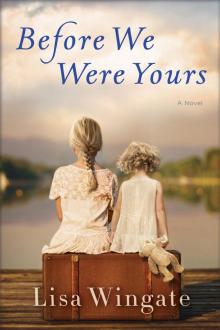 Before We Were Yours
Before We Were Yours A Sandy’s Seashell Shop Christmas
A Sandy’s Seashell Shop Christmas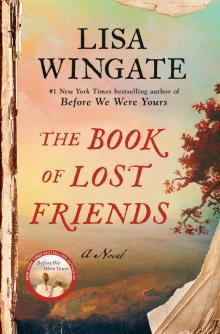 The Book of Lost Friends
The Book of Lost Friends Larkspur Cove
Larkspur Cove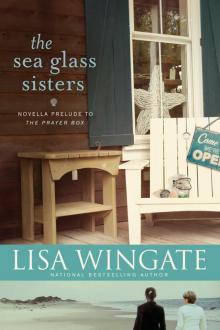 The Sea Glass Sisters
The Sea Glass Sisters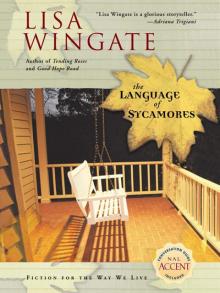 The Language of Sycamores
The Language of Sycamores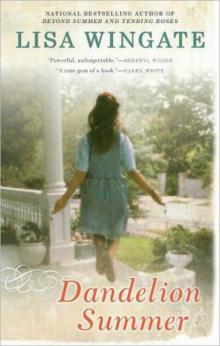 Dandelion Summer
Dandelion Summer Word Gets Around
Word Gets Around Beyond Summer
Beyond Summer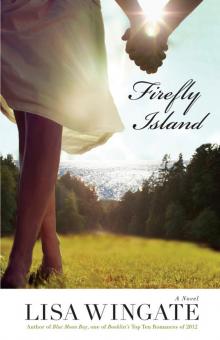 Firefly Island
Firefly Island The Tidewater Sisters: Postlude to The Prayer Box
The Tidewater Sisters: Postlude to The Prayer Box Talk of the Town
Talk of the Town![Blue Sky Hill [01] A Month of Summer Read online](http://i1.bookreadfree.com/i1/03/29/blue_sky_hill_01_a_month_of_summer_preview.jpg) Blue Sky Hill [01] A Month of Summer
Blue Sky Hill [01] A Month of Summer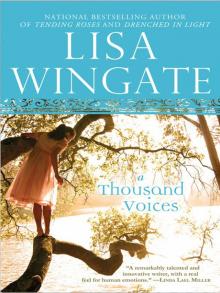 A Thousand Voices
A Thousand Voices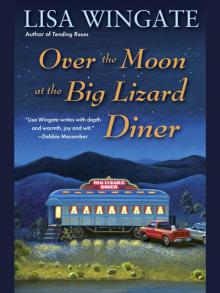 Over the Moon at the Big Lizard Diner
Over the Moon at the Big Lizard Diner Never Say Never
Never Say Never Good Hope Road
Good Hope Road The Summer Kitchen
The Summer Kitchen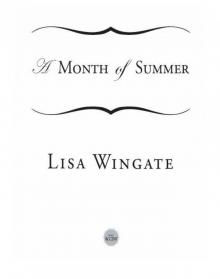 A Month of Summer
A Month of Summer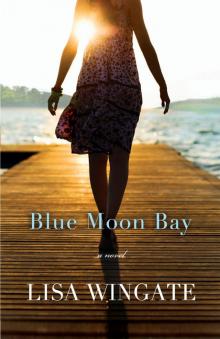 Blue Moon Bay
Blue Moon Bay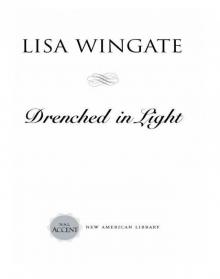 Drenched in Light
Drenched in Light The Sea Keeper's Daughters
The Sea Keeper's Daughters